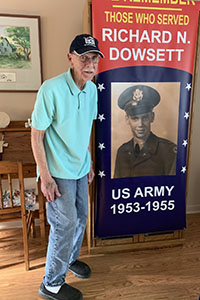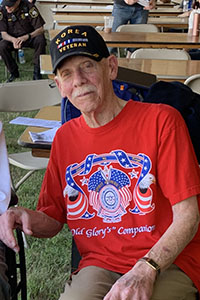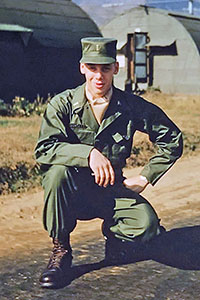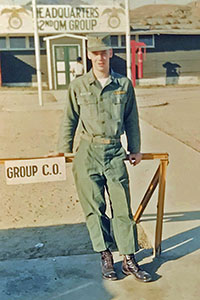Army Korean War St. Joseph, MI Flight date: 05/11/22
By Mark Splitstone, Honor Flight Chicago Veteran Interview Volunteer
Richard “Dick” Dowsett was born 1931 in Dowagiac, Michigan and spent his childhood there. After finishing high school, he attended Western Michigan University and graduated in 1953 with a degree in Business Administration. While there, he also participated in the Army ROTC program because he was interested in getting the experience. Throughout most of his college years, the Korean War was raging, and because of his role in the ROTC, he followed the war’s progress closely. During this time he became aware that his high school class president had been killed in Korea.
After graduating from college, he was commissioned to be an officer in the U.S. Army in July of 1953, which happened to be the same month that the Korean War Armistice Agreement was signed. After ROTC training, Dick was assigned to be in the Quartermaster Corps and reported to Fort Lee, Virginia for Quartermaster Officer School. He then became a Platoon Leader in a Quartermaster Service Company.
The Korean War had ended, but Cold War tensions were still very high. One of Dick’s first assignments was to participate in Operation Flash Burn at Fort Bragg, North Carolina in April and May, 1954. This was the largest military exercise ever conducted to that point by U.S. Armed Forces, and the goal was to simulate tactical nuclear warfare and train army personnel when operating in such an environment. Two new nuclear short-range missiles, the MGM-5 “Corporal” and the MGR-1 “Honest John” were used in this exercise, although they obviously were carrying non-nuclear payloads.
In July 1954, not long after the Flash Burn exercises were completed, Dick received orders to go to Korea. During his leave before shipping out, he managed to get married and also go on a short honeymoon in Michigan’s Upper Peninsula. He then left for Korea, with stops at Fort Lewis near Seattle and the Tachikawa Air Force Base in Japan.
In Korea, he was assigned to the 32nd Quartermaster Group (QMG) in Pusan. Pusan (now known as Busan) had become famous early in the Korean War when the North Korean Army pushed United Nations forces all the way back to the city. It looked like the war might end in defeat, but UN forces were able to hold the “Pusan Perimeter” and eventually push back the North Koreans. Pusan was one of only two Korean cities that never fell into North Korean hands during the war. By the time Dick arrived in 1954, the war had ended but Pusan had become the busiest port in Korea.
On November 19, 1954, Dick was in command of the 581st Quartermaster Company (Parts). The 581st had been commissioned in February, 1941 and served with distinction in the North African and Italian campaigns during World War II. It was decommissioned in 1945 and reactivated in 1950 to support the Korean conflict. Dick’s assignments were varied and included being responsible for the mess area for both Korean and U.S. soldiers. He was also detailed for the Board which was the officer-led proceedings dealing with disciplinary problems and court martials. Over the next four months, Dick served as a prosecutor, a defense attorney, and even as a judge for the Board. In March, 1955 he received a Non-Tactical Unit Officer award and was promoted to 1st Lieutenant.




One of the tragic consequences of the war were the orphaned children. Many refugees had poured into Pusan in the first months of the war, and thousands of them were still there. Upon Dick’s arrival in 1954, there were over 100,000 homeless and parentless children in Korea. There were over 400 registered orphanages in the country, with most of the orphanages being supported by U.S. soldiers. Dick remembers accompanying a group of soldiers who were bringing a load of lumber to one of the orphanages. This particular orphanage was called the Boys Democratic Village and was on an island in the Sea of Japan. Orphans from the age of 7 to 18 were present and were being instructed in the ways of democracy.
Many of the soldiers stationed in Pusan participated in healthy diversions such as volleyball and baseball to relieve the boredom that can enter military life during slow periods. Those activities didn’t interest Dick, but ping pong did. He became an expert player, and he and his partner never lost a doubles match. Dick also got to see some of the countryside and culture during his time in Pusan. He recalls visiting the Tangnay Buddhist Temples and he says it was a joy to see the beautiful Korean countryside looking so peaceful after all the years of war. On the Temple grounds, one could forget the death and destruction that had pervaded the land and brought the end to so many lives, both civilian and military.
In May, 1955 things were wrapping up in Korea. Dick was assigned the task of closing down the 581st Quartermaster Company (Parts) and he was officially the last commissioned commanding officer in the history of this storied organization. He returned to the U.S. after a total of seven months and 26 days in Korea. On his return voyage, a refueling stop was made at Midway Island. This was a treasured moment for Dick, because he remembered hearing stories from his uncle, who participated in the war in the Pacific about the importance of that battle. It was a great thrill for Dick to visit the island that was the center of the turning point in the battle of the Pacific and World War II.
Dick separated from active duty on July 19, 1955. He did not pursue a longer career in the Army as he was needed at home to help with the family business. He did, however, volunteer for the Army Reserves. His experience in the Reserves included a howitzer artillery group and platoon leadership. Dick left the Reserves with Captain’s bars in 1964. If he had stayed, there was a possibility he would’ve been called up for Vietnam. While he says he would have served there, he also says active duty would have been unlikely given that he had three small children and was the president of his family’s company by then.
The Dowsett Spring Company was owned by his father, and after coming home Dick worked as a clerk in the same building in which he had been a factory worker before his Army days. Dick’s father passed away in 1958 and at that point, Dick, just 27 years old, became the president of the company. His years of working on the shop floor, his business degree from Western Michigan, and the leadership experiences he gained in the military now came into good use as he assumed the helm of the family business. The company was a custom manufacturer of springs and had supported the WWII effort with several designs for the military. After the war, the company manufactured over 500 different types of springs for numerous customers, including a spring that Whirlpool used in the food delivery devices for the Apollo Space Program. Those springs are likely included in the trash left on the moon by the astronauts.
Dick led the Dowsett Spring company for 37 years before retiring in 1995. He has been very active in the community with leadership roles in the Dowagiac Planning Commission, Dowagiac Lions Club, Miss Dowagiac Blossomtime contest, Cass County Cancer Crusade and other organizations. His second wife, Phyllis, has also been very involved in the community. They share six children, seven grandchildren and two great-grandchildren.
Dick, we thank you for your valuable service to your country in Korea. Enjoy your well-deserved day of honor with your fellow American heroes on the 101st flight of Honor Flight Chicago.


